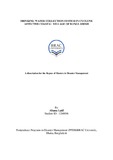| dc.contributor.advisor | Kabir, Dr. Md. Humayun | |
| dc.contributor.author | Latif, Afsana | |
| dc.date.accessioned | 2018-01-24T05:32:39Z | |
| dc.date.available | 2018-01-24T05:32:39Z | |
| dc.date.copyright | 2017 | |
| dc.date.issued | 2017 | |
| dc.identifier.other | ID 11268006 | |
| dc.identifier.uri | http://hdl.handle.net/10361/9155 | |
| dc.description | This dissertation is submitted in partial fulfillment of the requirements for the degree of Master in Disaster Management, 2017. | en_US |
| dc.description | Cataloged from PDF version of Dissertation. | |
| dc.description | Includes bibliographical references (page 61-62). | |
| dc.description.abstract | The implications of Cyclone in Bangladesh are the sea level rising, changes of climate
patterns, man-made alteration of natural settings and main salinity in river water is increasing
rapidly in the community of southern Bangladesh. After the cyclone SIDR and AILA surface
water and also ground water on the southern side of Bangladesh became salty. People were
also suffering from drinking water during the year. The most important factor is the lack of
the collecting technique for drinking water.
In my research, I tried to find out the collecting technique to develop, which can help in
gathering drinking water consistently, also better understanding of the process of salinization
of drinking water resources in Bangladesh. All the data from field study was being collected
in two different unions. One was SUTARKHALI union and other is TILDHANGA union. So
that we can actually understand the effects of cyclone damages and suffer from the shortage
of drinking and safe water. As research methods, both secondary and primary sources were
applied. The groups targeted to be interviewed were community people in the coastal
community, officials of non-governmental and governmental organizations.
Efficient aspects for lack of drinking water are salinity, shrimp farming, and arsenic. In water,
salinity is making the lives of people miserable. They have social, economic or physical
consciences. There is some traditional strategy regarding the collection system of drinking
water. This knowledge is based on common sense and experience, but does not have any
engineering basis. During the year they can collect the water from rain water, saline water
and some point in a dew drop. In some process, they can use this water for drinking.
This thesis discussed a device for collecting drinking water called PANI [Purified Aqua for
Numerous individual] which is based on regular knowledge and throughout some technology.
Hopefully, these are helping for collecting drinking water throughout the year with salinity
ingression, also economically affordable, easy accessibility, maximum use, portability and
durability for the affected community of southern Bangladesh. | en_US |
| dc.description.statementofresponsibility | Afsana Latif | |
| dc.format.extent | 63 pages | |
| dc.language.iso | en | en_US |
| dc.publisher | BARC University | en_US |
| dc.rights | BRAC University dissertation are protected by copyright. They may be viewed from this source for any purpose, but reproduction or distribution in any format is prohibited without written permission. | |
| dc.subject | Cyclone | en_US |
| dc.subject | PANI | en_US |
| dc.subject | Drinking water | en_US |
| dc.subject | Coastal village | en_US |
| dc.title | Drinking water collection system in cyclone affected coastal village of Bangladesh | en_US |
| dc.type | Dissertation | en_US |
| dc.contributor.department | Department of Architecture, BRAC University | |
| dc.description.degree | M. Disaster Management | |

